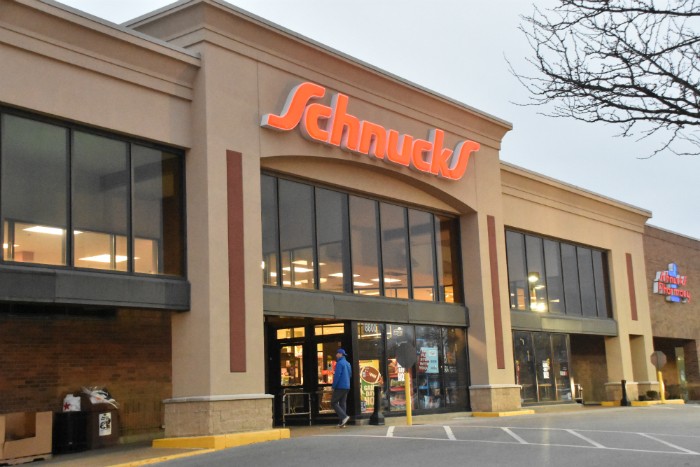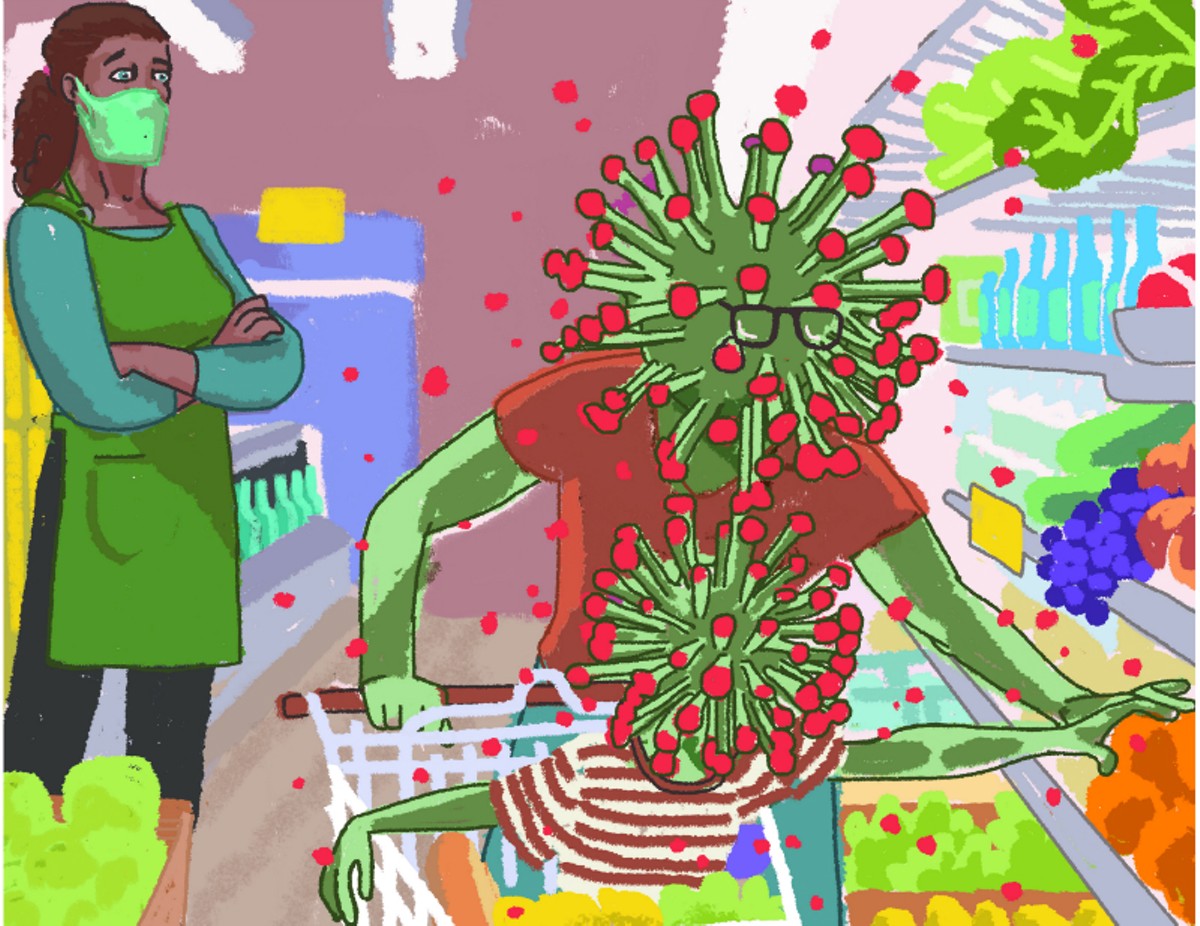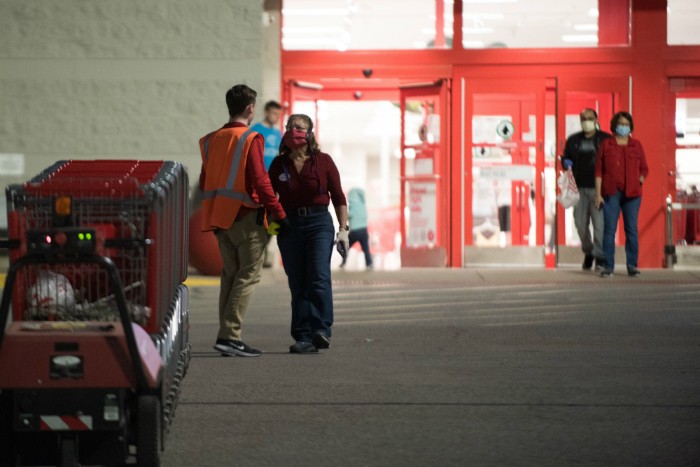At the risk of revealing how truly dull I am, I used to find grocery shopping a calming activity. I love to cook, and sitting down to write a grocery list felt like a respite from everyday anxieties. Even the physical act of shopping was mostly soothing; in under an hour, I could efficiently comb the shelves and look forward to the meals I'd make with those ingredients in the days ahead. If I had a bad day, I could always come home and unwind with the simple pleasure of preparing a meal.
As COVID-19 slowly spreads across the country and restaurants temporarily close or reduce their hours, people are cooking even more at home, myself included. No longer a source of calm for me or anyone else, grocery stores are now destinations for essentials; we don't linger a minute more than needed or make a trip more often than absolutely necessary.
As customers, our internal anxieties about grocery shopping are intensified by the very precautions implemented to protect us inside of stores: Signage urging vigilant social distancing, checklane lines with customers spaced two cart lengths apart, tape on the floors indicating how far to stand from other shoppers, plexiglass barriers shielding workers from us and the chemical sting of Clorox and Purell in the air. Employees are wearing face masks, and if we're responsible, so are we.
For the people working from behind those masks, though, there is no relief from the anxiety and stress of virus exposure. This weighs heavily on my mind, as my mom works in a grocery store. She's spent the past decade working in various departments, from fielding orders behind the seafood counter to preparing vegetable trays and hot foods. She's worked the day after Thanksgiving and Christmas for as long as I can remember. It's why she doesn't take lavish vacations or like to make plans before she can see her weekly schedule. She's a loyal and dedicated employee who takes pride in her work.
Recently, though, because her age puts her in the high-risk category for the virus, she's taken all of her vacation time in an effort to stay at home. Soon, she will have to return to work, as she isn't in a position to quit.
Unfortunately, although she meets the criteria to be considered high risk, she is not eligible for additional time off through her union. The same isn't true for her co-workers who are part of a different union, the United Food and Commercial Workers Local 655. Within just one grocery store, multiple unions can represent workers across different departments. Under normal circumstances this makes sense, but now, when all workers are being put in customer-facing roles, it creates an environment where employees working side by side may not receive the same level of union protection.
Recently, Local 655 brokered a deal with its partners at Schnucks, Dierbergs, Straub's and other independent stores to allow high-risk employees to apply for disability due to COVID-19. If approved, the benefit would allow employees to stay home for thirteen weeks and their jobs would be held for them, they would be paid 90 percent of their usual salary and their health benefits would continue.
The benefit is an impressive and critical step to protect some of the most vulnerable grocery store employees in our city — but unfortunately, it's not available to all of them. Workers like my mom still have more protection than many essential retail employees right now, though, as there is no union representation for workers at many national chains.
David Cook, president of United Food and Commercial Workers Local 655, says he's proud of the COVID-19 disability benefit his union has established for its workers. In the same breath, though, he acknowledges that many other employees — sometimes even within the same store — aren't so lucky.
"I don't think, in all honesty, that the other employees have that same benefit," Cook says. "They all made improvements, but I don't think anybody went to the level that we went to [in Local 655, which was 90 percent [of their usual salary paid for COVID-19 disability.] For example, if a Local 74 person has moved to 655 jurisdiction [due to the pandemic], I have allowed that to happen, but generally speaking, I grieve over saying that somebody outside of my bargaining unit is doing my work. But they would not fall under my benefit package."
There is no simple answer to how to protect essential workers right now. Cook says his employers have done an excellent job putting protections and precautions in place in their stores — much more than many non-union stores in town, he adds.
And Cook sympathizes with his employers. There are five different unions for grocery workers in the metro area, and employers are bargaining with each one. That bargaining has never been more critical than now, when everything else store management is juggling is just as critical.
"If I was in their shoes," Cook says, "I'd be going nuts."
Etta had only been working at Target for a short period of time when COVID-19 hit the St. Louis area.
Before landing the gig, she had been unemployed for a month after the retail store where she previously worked shuttered for good, and she was badly in need of a new job.
"I was desperate for anything, and I got hired on the spot," Etta says. "I was like, 'OK, cool. Target is a great company.' Then as the weeks went on, I thought, 'Should I even be doing this anymore?'"
Choosing to quit, though, hardly feels like a choice. She already has a second job to make ends meet, and she's not sure how much non-customer-facing work is available right now anyway. Like retail chains big and small across the U.S., Target recently gave employees a temporary pay bump amid COVID-19. The extra money is nice, Etta says, but it's hardly enough to ease the stress that comes with working in retail during a pandemic.
"The reality of it is every time I'm driving into work, I have anxiety," she says. "There's been days where I don't feel safe coming in. I'm getting paid $2 more an hour right now, so I'm making $15 an hour to risk my life every day."
In some states and cities across America — including Springfield, Missouri — local or state officials have requested that stores such as Target, Walmart and CostCo temporarily limit or bar the sale of nonessential products amid COVID-19. In early April, customers at Walmart locations in the Springfield area found signs posted around the stores stating that items in some departments and aisles were nonessential and therefore not currently for sale.
These kinds of restrictions make sense to Etta, who spends most of her six to eight hour shifts at Target in the clothing department. Despite the virus being easily transmitted on surfaces, Etta says that many customers are still shopping for clothing as they did before the pandemic.
"It should be roped off," she says of nonessential departments. "You can get by without that $5 T-shirt. Only pharmaceutical, grocery and toiletry — which we can't ever keep in stock anyways — [should be open]. And if you're not interested in buying it, don't put your hands on it. You don't have to go through and touch everything, which is what's happening."
Wearing a face mask she made herself, Etta says she spends most of her shifts folding and sorting clothes and picking up after customers. Target isn't currently requiring employees to wear face masks, and unlike area grocery stores, there is no plexiglass separating checklane workers from customers. Etta says her store has been vigilant about cleaning carts and conveyor belts, which is a source of comfort. (When reached for comment, a Target representative stated that the company isn't "currently coordinating interviews.")
"I made myself a mask cause I've got to do what I can to protect myself," Etta says. "It's still a job; I still have to show up. Maybe four of us are wearing masks; I think it should be mandatory. It's insane the amount of people that are in there to shop and like it's nothing."
David Cook at Local 655 agrees with Etta. Most Target workers aren't under union protection, but his union recently petitioned Missouri Governor Mike Parson to require that customers of all essential businesses wear face masks when shopping in essential retail stores. So far nothing official has come of that, but Cook continues to voice the message to his employers and through interviews with local media.
"Most of the retailers that I represent today, and a lot of the nonunion ones, are now providing some type of mask for their employees," Cook recently told St. Louis Public Radio. "And that's great — the mask protects the public from getting an infection from them — but nothing protects them from the public." (As part of a revamped stay-at-home order issued last week, St. Louis is now requiring essential businesses to provide appropriate personal protective equipment to employees.)
Etta has experienced plenty of compassionate and empathetic customers, she says, including many wearing masks and gloves in the store, and it makes the work a little easier. There are still plenty of customers who approach her and her co-workers with frustrations, though, especially when items are out of stock.
"Most people have been pretty understanding about it, knowing that it's hard to find that stuff anywhere, but then there's going to be that asshole who's like, 'Well, why can't you get it in?'" she says. "'Well, because the world is having a shortage.' It's just like, it's bigger than you. That's the frustration: The people who are just self centered and aren't seeing the bigger picture, about how many millions of people are affected by this."
For Steve, working at Whole Foods started as a second job. Amid COVID-19, though, it's become his main gig, although he hopes that isn't the case forever. His experience working retail during the pandemic has been different than many of his co-workers, as his department, prepared foods, has been pretty slow in recent weeks.
"I work in the prepared foods department, so the deli counter, pizza station and the sandwich and taco stations," he says. "I was doing that, and it was always usually pretty busy until this happened, and now it's pretty dead. I've been working at the pizza station a lot, and I make about one pizza a shift, and that's about it."
In his experience, Whole Foods management has done as much as possible to protect employees and customers at his store, including supplying workers with face masks and installing plexiglass dividers at each of the checklanes. Originally those dividers only extended the length of the checker station, but now they've been expanded across the conveyor belts.
Steve notes that employees who wear glasses have had a little difficulty wearing face masks for long shifts, as breathing while wearing them tends to fog up their lenses, but it's a small frustration to protect themselves and customers from exposure. He adds that cleaning and sanitizing has been kicked into overdrive, and recently, the store has started limiting the number of customers who can shop inside at one time.
Employees have received a temporary $2-an-hour raise for working during the pandemic; originally those raises were available through the end of April, but Steve guesses the timeline will be extended based on when the virus peaks in St. Louis. He adds that employees have been able to call out or take a leave of absence without any consequences, but that time off is unpaid. Still, having this option has allayed the anxieties of many of his co-workers, who he says have elected to stay at home for the time being. (When reached for comment, a Whole Foods representative said the company was "unable to accommodate an interview at this time.")
For Steve, these days, a normal shift involves a lot of cleaning — "our kitchen area has probably never been cleaner," he says — and monitoring the prepared foods cases.
"On the pizza station, I now package up all the pizza, whereas before I would just put it out and it was with a little spatula and it was self-serve," he says. "Now I box it up, and because you can't see it, there's people who just start going through the pizza, like opening it up to try and pick out the one they want, and then it's like, 'Well, every [box] you just opened I have to throw away now.'"
The pizza boxes are labeled, of course, but Steve thinks those types of customers just aren't approaching their grocery shopping with a different mentality during the pandemic.
That underlines one of the biggest risks that essential retail workers are facing right now: Even as management takes steps to keep employees and customers safe, there is little they can do about how customers comport themselves inside and outside the store. Steve says that he's noticed piles of gloves discarded in the Whole Foods parking lot — something all three retail workers interviewed for this story mentioned as a problem — which are, of course, then cleaned up by employees.
"If nobody picks it up, where do you think that's going to go?" he says. "It's a plastic glove. It's not going to just wash away."
Since his department has been slow, Steve says that management has asked him to start helping limit the number of customers who enter and exit the store. (In this case, 30 people at a time.) He's grateful to be busy and enjoys the work, adding that people have generally been understanding about the new restriction if not grateful for it.
Steve says he doesn't worry too much about contracting the virus, as he lives alone, but he fears for the safety of his family members, including his young nephews, during the pandemic. If his income at Whole Foods wasn't critical, he says he would likely stay home to protect himself, but it's just not financially feasible for him.
"I read on the internet the other day about how, you know, we're not really essential employees — we're more like captive employees," he says. "We took these jobs because we need the money and maybe we need the benefits, and we're not in a position to where we can quit. I'm going in because I have to go in. I'm not going in because I'm like, 'Oh, the people need food.' I'm not being self-sacrificing. I'm doing this 'cause I have to; if I had a choice, yeah, I'd probably just stay home, but I don't have that option."
Like Target, Whole Foods workers are not unionized. In recent years, Whole Foods employees have banded together under a group called Whole Workers to advocate for more protections for employees and encourage unionizing. Billionaire Jeff Bezos, the founder and CEO of Amazon, purchased Whole Foods in 2017 and has been taken to task by politicians such as U.S. senators Bernie Sanders and Elizabeth Warren for "potentially illegal anti-union behavior."
In an open letter released in 2018, the senators criticized Bezos for a leaked Whole Foods training video that directed team leaders to discourage unionization. Following the leak, Amazon and Whole Foods announced plans to raise the minimum wage for its employees to $15 an hour.
"Whole Foods's stated aim to 'set the standards of excellence for food retailers' and observation that 'our leaders think long term and don't sacrifice long-term value creation for short-term financial results' are in direct contradiction to what appears to be systematic incitement of supervisors violating workers' rights by illegally interfering with their organizing activities," the senators wrote.
In the St. Louis area, David Cook at Local 655 says that his union has heard unsettling stories about worker conditions at non-union stores, but because employees can't officially organize and bargain for protection, there could be variance in working conditions from store to store instead of chain to chain.
"We're hearing some horror stories, especially as it relates to Whole Foods, Trader Joe's, and not only here but across the country," Cook says. "Dollar General is another one that's really instituting what I call bad practices. We're trying to communicate with that [employee] population and let them know we're fighting for them, because I don't care if they're in my union or not."
Recently, Cook has been in touch with a group of non-union grocery workers called Who Are We to communicate a united message between his union with non-union employees regarding their shared concerns and goals. Founded by grocery store employee Chris Dean, the Who Are We movement is fighting to advocate for increased protections for essential retail workers amid COVID-19.
"We are risking our lives, and the Who Are We movement is here to let everybody know that that is not OK," Dean said in a recent interview with St. Louis Public Radio. "We deserve to live, and we deserve to be safe at work."

Karen has worked for Schnucks for most of her adult life. She enjoys the work, but it's still just that — a job she relies on for income. She doesn't worry about contracting the virus and what it could do to her health, she says, but rather, she's concerned with the health of her young children and her mother, who lives with her family.
"For me, personally, it makes me feel scared, just because if I were to get sick or get anything, then I'm bringing it all home to them," she says. "I worry about that."
She has been heartened to see how Schnucks has responded to COVID-19, though, for the safety of its employees and customers. Checklanes have been outfitted with plexiglass barriers and were recently expanded to cover a portion of the conveyor belts, as well, and Karen says cleaning and sanitizing surfaces, including conveyor belts and carts, has become a top priority. As an employee and customer, the steps make her feel safer — or as safe as anyone can feel out in public right now.
"And then they have stickers on the floors now for people to stand six feet away from the counter when you're waiting so not everybody ends up right at the deli counter," she says. "So trying to tell everybody, 'Hey, you can take a number and then stand back on the red square,' they kind of look at you like, 'What?' But it's like, 'No, we're trying to do the six foot rule.'"
Her store recently began limiting the number of customers who can shop in the store at one time, too, to comply with a recent mandate from Governor Parson. On the company's official website, there's even a customer count tracker for each store so that people can view the current situation at their neighborhood location. A Schnucks worker is stationed at all store entrances and the tracker is regularly updated.
Paul Simon, senior communications specialist at Schnuck Markets, says that the company is constantly evaluating how to adapt store operations to better protect customers and employees. In addition to noticeable changes in stores, he adds that the company has recalibrated the HVAC systems in its stores to recirculate air more frequently.
"The situation has evolved and continues to evolve daily, and we continue to adjust and make changes to our operations almost daily as well," Simon says. "The safety of our teammates and our customers is the top priority for us, and therefore we've taken many steps at our stores to prevent the spread of the disease and to also educate our teammates and customers about ways that they can help prevent the spread of the disease."
The company has also mandated that all employees have their temperatures taken using a forehead thermometer before every shift, and employees are required to wear masks while working — although Karen says some employees complain of headaches or shortness of breath from hours of use.
"People are having panic attacks and freaking out because [the face masks] make it harder to breathe," she says. "And then people who are already prone to anxiety have had issues with that. I was running back and forth, wearing the mask, walking faster and getting everything done, and all of a sudden, I stopped and I'm like, 'Why am I having trouble breathing? Do I have ... no, no, it's the mask, calm down.' As soon as you walk into a back room where nobody's at, remove it and take a big breath, you're like, 'Oh no, I'm good.'"
Schnucks also offered its employees relief in the form of bonuses: Full-time employees were given $500 bonuses and part-time workers received $250 for working during the pandemic.
"Our teammates are working extremely hard and extremely long hours at this time, and we understand that and we want to reward them for their work, and that was our way of doing that, Simon says. "It was a cash bonus that we wanted to get in their hands as soon as possible."
David Cook at Local 655 says he's proud of the safety protections his union has negotiated with employers such as Schnucks, although he continues to advocate for grocery stores to require customers to wear masks as well as employees.
"I've gotten some pushback from some people saying, 'Who are you to tell me I need to wear a mask?' and to me, it's just a societal community situation; we all have a responsibility to protect the community we live in," Cook says.
Cook adds that while he can't force customers to wear masks, he's been happy to see how his employers have responded to the pandemic so far.
"I really do have to tip my cap to Schnucks, Dierbergs and Straub's," he says. "They have really put their best foot forward."
There is no foolproof way to completely eliminate exposure risk, of course, and so that anxiety is still present for workers and customers. Yet Karen echoes Cook's feeling on how thoroughly Schnucks is working to protect its employees and customers right now.
"They've never gone through something like this, so they're trying their best to do this and just to keep us informed on how they're trying to help," Karen adds.
Still, as it does for all of us, the pandemic looms large, and recently, for Karen, it hit close to home. In recent weeks she learned that one of her relatives has contracted the virus, the first person she's known to get sick with it, and now his partner is showing signs of it as well. Karen has dropped off groceries for those relatives in recent weeks, making sure not to come into contact with them. She describes detailing with them how she would leave the bags on the front porch and jokes about waving to them from outside the house.
That can be the hardest part, though — having to be physically distant from a loved one who is sick with COVID-19.
"He's doing much better now, which is good, and I think they're in the clear of it, but they just found out that he was officially positive," she says. "It makes it more real when you know somebody who has it."
Karen's concerns for her family are understandable, especially her fear that she could expose her own immediate family to the virus. Several retail workers in the St. Louis metro have tested positive, although the exact number is hard to come by. Her job requires her to interact with customers hour by hour, minute by minute, and to touch surfaces that customers are constantly touching. Her risk of exposure is high compared to the many people who can work from home right now, an option she and other essential retail workers don't have.
Her family, though, like the families of so many essential retail workers, are bound to worry about Karen. I personally understand that stress and anxiety well.
Like so many retail workers, my mom doesn't have the luxury to stay at home. As I worry for her health and safety, she, like Karen, is much more concerned with everyone else in our family. She worries about relatives who are high risk, including my grandmother, who is sick with dementia in a nursing home. She worries about my sister, who lives out of state and is pregnant with her first child.
By the time this story hits newsstands, my mom will likely be back at work, stocking shelves or ringing up groceries, despite not being protected by the union that represents those workers. She will be wearing a mask, even if it gives her a headache or fogs up her glasses, and I'll be praying that every customer does the same. My mom lives alone, in the same house I grew up in, and if she gets sick with COVID-19, she will be sick alone. I won't be able to care for her in the rooms where she once cared for me.
It's a heartbreaking thought, but what's just as upsetting is that it's the same reality for scores and scores of people right now, and there's really no solution.
Later this year, my mom plans to visit my sister and her husband when their baby is born. Having now taken all of her vacation time due to COVID-19, her new plan is uncertain, as is so much right now. What I do know for sure is that for my mom, the thought of meeting her first grandchild will lighten her spirit amid the stress and anxiety of going into work.
It represents a joyful future, still far enough away to anticipate but close enough to begin celebrating. It's a hope that we will all be together again, that our family will grow, that there's light just a little further off in the distance — if only we can make it there.








